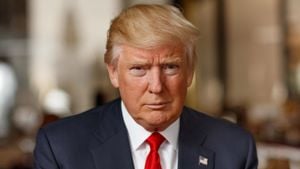Former President Donald Trump is again making waves with his recent appointments for key positions within his administration as he gears up for another term. This time around, Trump's cabinet choices have thrown the spotlight on several controversial figures, spurring discussions across the political spectrum. Among those tapped for serious roles are Robert F. Kennedy Jr. for Health and Human Services and Rep. Matt Gaetz for Attorney General.
Trump's selection of RFK Jr., known for his vocal skepticism of vaccines and public health policies, hasn’t just generated chatter—it's sent shockwaves through the health sector. The stock prices of vaccine manufacturers, including Moderna, took noticeable hits following the announcement of Kennedy's appointment. His history of promoting debunked health theories raises significant concerns about the future direction of public health policy under his leadership.
Kapitalizing on the potential backlash, Trump has quickly moved to solidify his base by choosing allies firmly entrenched within the MAGA movement. Gaetz, who is facing multiple investigations, including allegations of sexual misconduct, is another bold pick making headlines. His reputation as a firebrand and staunch supporter of Trump raises eyebrows, especially considering the important jurisdiction the AG's office holds over prosecutorial decisions.
At the core of these selections lies Trump's strategy: staffing his administration with individuals he perceives as loyalists who will abandon traditional bureaucratic norms. According to sources close to Trump, he is actively seeking candidates who will dismantle the so-called "deep state"—government employees viewed as overly entrenched or resistant to his agenda.
Among the other names floated for cabinet positions, North Dakota Governor Doug Burgum is slated for the role of Interior Secretary. Burgum, who has made headlines for his pro-drilling stance and support of the energy sector, has been linked to plans to accelerate oil and gas exploration on federal lands, echoing Trump's prior policies during his first term.
Despite the ambitious changes proposed, the road to confirmation may not be smooth. Many of Trump's appointees, especially Gaetz and Kennedy, could face intense scrutiny, not just from Senate Democrats but also from some of their Republican colleagues. Concerns are brewing over Gaetz's eligibility to lead the Department of Justice, especially considering the criticisms he might encounter as he navigates his own legal entanglements.
The tumultuous political backdrop reflects how polarization impacts these appointments, making it challenging for any nominee to gain bipartisan support. While Trump may revel in picking unconventional choices, each selection carries significant political weight and may hinder the smooth functioning of his envisioned cabinet.
Senator Marco Rubio's potential nomination as Secretary of State seems to indicate some attempt at reconciliation within the fractured Republican Party. Although he may irk some elements within the MAGA base, Rubio has shown a willingness to work across party lines, which could be beneficial as Trump crafts his foreign policy on the global stage.
Rubio's experience as chair of the Senate Foreign Relations Committee and his involvement with national security give him credibility for the role, which is expected to change direction dramatically, much like other departments, under Trump's renewed vision.
One glaring distinction from Trump's past cabinet is the visible shift from what some considered more moderate appointments to bold, partisan choices. The previous administration saw seasoned individuals like James Mattis and John Kelly, who brought military and governance expertise to their roles. Trump's new appointments seem geared toward radical change rather than stability.
Potentially controversial names are not reserved solely for cabinet positions. Trump is also expected to make nominations for lesser-known but powerful roles such as the Solicitor General, where he has nominated Dean John Sauer, who has defended Trump’s interests previously, raising questions about the impartiality of the legal advice he may provide.
Political analysts suggest these selections could lead to heightened legislative gridlock if the Senate confirmation hearings turn contentious. Trump will likely face pushback not just from Democrats but potentially moderate Republicans, especially if they’re confronted with their colleagues’ past legal missteps during the hearings.
The practicalities of confirming such contentious figures could divert attention from key issues confronting the administration, including pressing national economic concerns and complex foreign policy challenges. Potential conflicts of interest among nominees may also be vigorously debated.
While the appointments have stirred excitement among staunch Trump supporters, they also sparked anxiety among moderates and center-right voters. Many question whether these figures, particularly controversial nominations like Gaetz and Kennedy, will truly represent effective governance or merely amplify the discord already present within American politics.
The coming months will prove pivotal as Trump's second term gears up. How smoothly his cabinet can function remains to be seen, with each appointee's actions under microscopic scrutiny. For many Americans, the question is no longer who will be serving but rather how these choices will reframe the entire political conversation.
With news of these appointments circulating, the nation awaits the upcoming confirmation hearings, knowing they may set the tone for the direction of governance during what could be another tumultuous term under Trump's leadership.



